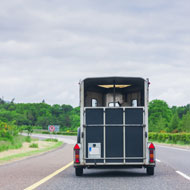New rules for exporting equines in event of no-deal Brexit

Owners will need to consult with a vet at least six weeks before they are planning to travel.
The government has published new rules for exporting horses and other equines in the event of a no-deal Brexit.
The guidance states that if the UK leaves the EU without a deal, equines travelling from the UK to the EU may need to undergo additional blood tests. These will need to be carried out within 30 days or less of travelling to satisfy EU regulations.
Owners will also need to consult with a vet at least six weeks before they are planning to travel. To be able to travel to EU states, all equines will require an Export Health Certificate and will need to enter the EU via a Border Inspection Post (BIP).
Furthermore, some equines will also require a government-issued travel ID document, in addition to their existing equine passport.
The government said that movement on all equines from EU member states will be allowed to continue ‘to support the industries that rely on these animals’. It added that it is continuing to negotiate with the European Commission on securing listed status for the UK, which would enable the continued movement of equines to EU member states.
Animal welfare minister David Rutley said: “Delivering a negotiated deal with the EU remains the Government’s top priority, but it is our job to responsibly ensure we are prepared for all scenarios, including no deal.
This guidance will help businesses and owners prepare for life after 29 March if we do leave without a deal. However, it is in the interest of the EU to reciprocate our commitment on the movement of horses. This will ensure horseracing and competition events across the continent can continue to be attended by all of Europe’s top equine talent.”
Julian Richmond Watson, chairman of the Thoroughbred Breeders Association, said: “The British thoroughbred racing and breeding industry welcomes publication of this important guidance and will be communicating it to our participants to help them prepare for all potential Brexit negotiation outcomes.
“We fully support the Government’s welcome and pragmatic position to allow continued equine movement under current systems from EU member states to the UK in a no deal scenario.
Nick Fellows, chief executive of the British Equestrian Federation (BEF), said: “The BEF has worked closely with government and leading figures in equestrian sport to make sure that all horse owners have as much information as possible for when the UK leaves the European Union. It’s important to prepare for all eventualities and we’d urge all horse owners to take notice of the material provided by Defra.”



 The Federation of Independent Veterinary Practices (FIVP) has announced a third season of its podcast, Practice Matters.
The Federation of Independent Veterinary Practices (FIVP) has announced a third season of its podcast, Practice Matters.